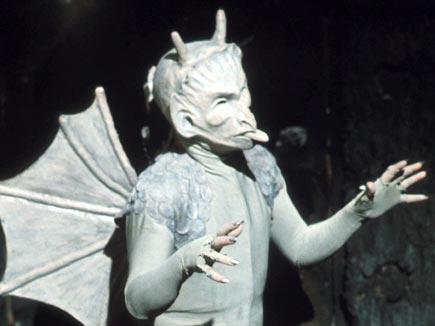Written by Robert Sloman and Barry Letts
Directed by Christopher Barry
As the final serial for the eighth season, the capstone to the loose season-long Master arc, this story was in a tough position. Unlike a lot of fans, I wasn’t impressed by much of the eighth season, and it wasn’t until “The Colony in Space” that I felt like the writers actually gave the Master a clear characterization. Also, some of the concepts at play in those previous serials fell well short of the creativity of the seventh season.

“The Daemons” is far from perfect, but I must give it credit for centering on the idea that magic is little more than science or technology that has yet to be understood. Or, in slightly different terms, an aspect of the natural world that a particular individual or society’s scientific understanding has yet to address.
In the 1970s, the “paranormal” was enjoying something of a pop culture comeback. Evolving out of the “new age” thinking of the counterculture movements of the 1960s onward, paranormal subjects from ghosts to demonic entities to UFOs were gaining ground. By the end of the decade, it would be pervasive in films, television series (scripted and “reality”), endless books, and so on. In that sense, the past decade or so has been very similar, almost a revival of that period.
As someone who believes that science should investigate the unexplained, not explain the uninvestigated, I always enjoy stories that play with the tension between belief and reason. This story plays with the notion that something as seemingly magical as dark rituals and demonic beings could simply be window-dressing for unusual communication with a dangerous alien race offering enormous power.
Granted, it all boils down to the same thing: the Master finds a way to gain enormous power, but overlooks even the most obvious of drawbacks in the methods required to do so. The Doctor and his allies must manage both the defeat of the Master and mitigation of the scheme’s consequences. Hilarity ensues.
Much has been made of the Doctor’s insufferable patronizing attitude in this story, and I must agree. He talks down to Jo and the Brigadier to the point where any reasonable person would start protesting, at the very least. Except, of course, they probably assume the same thing I did: that the Doctor’s brief “liberty” in the previous story makes his exile chafe all the more. The Doctor is never happier than when he is free to roam about. As he told the Master in the previous serial, he wants to see the universe, not rule it. That is why the Time Lords chose exile as a punishment in the first place.
It’s fairly clear, though, that by this point, the intention of turning the Brigadier into something of a hapless comic foil (whenever military action isn’t needed, of course) was well into execution. Gone are the stories where the Doctor and the Brigadier debate their perspectives on an issue on equal ground. When even Yates is mocking the Brigadier openly, it’s just a bad turn of events.
It’s really the end result of the changes that started with Jo Grant replacing Liz Shaw. Liz may have been given little chance to grow into a full character, but Jo is little more than eye candy and exposition aid. Jo is always available to ask the most basic of questions to set the stage for the story or provide the Doctor with a chance to explain the logic of a plot turn. While I’m hardly complaining about the miniskirts and go-go boots, I can’t help but wish she was more than a writing convenience.
Writing: 2/2
Acting: 2/2
Direction: 2/2
Style: 1/4
Final Rating: 7/10

